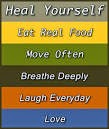What is emotional intelligence?
Emotional
intelligence (EQ) is the ability to identify, use, understand, and manage
emotions in positive ways to relieve stress, communicate effectively, empathize
with others, overcome challenges, and defuse conflict. Emotional intelligence
impacts many different aspects of your daily life, such as the way you behave
and the way you interact with others.
If you
have high emotional intelligence you are able to recognize your own emotional
state and the emotional states of others, and engage with people in a way that
draws them to you. You can use this understanding of emotions to relate better
to other people, form healthier relationships, achieve greater success at work,
and lead a more fulfilling life.
Emotional intelligence consists of four
attributes:
Self-awareness – You
recognize your own emotions and how they affect your thoughts and behavior,
know your strengths and weaknesses, and have self-confidence.
Social awareness – You
can understand the emotions, needs, and concerns of other people, pick up on
emotional cues, feel comfortable socially, and recognize the power dynamics in
a group or organization.
Relationship management – You
know how to develop and maintain good relationships, communicate clearly,
inspire and influence others, work well in a team, and manage conflict.
Why is emotional intelligence (EQ) so
important?
As we
know, it’s not the smartest people that are the most successful or the most
fulfilled in life. You probably know people who are academically brilliant and
yet are socially inept and unsuccessful at work or in their personal relationships.
Intellectual intelligence (IQ) isn’t enough on its own to be successful in
life. Yes, your IQ can help you get into college, but it’s your EQ that will
help you manage the stress and emotions when facing your final exams.
Emotional intelligence affects:
Your
performance at work. Emotional intelligence can help you navigate the social
complexities of the workplace, lead and motivate others, and excel in your
career. In fact, when it comes to gauging job candidates, many companies now
view emotional intelligence as being as important as technical ability and
require EQ testing before hiring.
Your
physical health. If you’re unable to manage your stress levels, it can lead to
serious health problems. Uncontrolled stress can raise blood pressure, suppress
the immune system, increase the risk of heart attack and stroke, contribute to
infertility, and speed up the aging process. The first step to improving
emotional intelligence is to learn how to relieve stress.
Your
mental health. Uncontrolled stress can also impact your mental health, making
you vulnerable to anxiety and depression. If you are unable to understand and
manage your emotions, you’ll also be open to mood swings, while an inability to
form strong relationships can leave you feeling lonely and isolated.
Your
relationships. By understanding your emotions and how to control them, you’re
better able to express how you feel and understand how others are feeling. This
allows you to communicate more effectively and forge stronger relationships,
both at work and in your personal life.
How to raise your emotional intelligence
All
information to the brain comes through our senses, and when this information is
overwhelmingly stressful or emotional, instinct will take over and our ability
to act will be limited to the flight, fight, or freeze response. Therefore, to
have access to the wide range of choices and the ability to make good
decisions, we need to be able to bring our emotions into balance at will.
Memory
is also strongly linked to emotion. By learning to stay connected to the
emotional part of your brain as well as the rational, you’ll not only expand
your range of choices when it comes to responding to a new event, but you’ll
also factor emotional memory into your decision-making process. This will help
prevent you from continually repeating earlier mistakes.
To
improve your emotional intelligence—and your decision-making abilities—you need
to understand and manage your emotions. This is accomplished by developing key
skills for controlling and managing overwhelming stress and becoming an
effective communicator.
Developing emotional intelligence through
a few key skills:
Emotional
intelligence (EQ) is built by reducing stress, remaining focused, and staying
connected to yourself and others. You can do this by learning key skills. The
first two skills are essential for controlling and managing overwhelming stress
and the last three skills greatly improve communication. Each skill builds on
the lessons learned in practicing the earlier skills and include:
The
ability to quickly reduce stress in the moment in a variety of settings
The
ability to recognize your emotions and keep them from overwhelming you
The
ability to connect emotionally with others by using nonverbal communication
The
ability to use humor and play to stay connected in challenging situations
The
ability to resolve conflicts positively and with confidence.
How to learn the key skills that build
emotional intelligence
The
key skills of emotional intelligence can be learned by anyone, at any time.
There is a difference, however, between learning about emotional intelligence
and applying that knowledge to your life. Just because you know you should do
something doesn’t mean you will—especially when you become overwhelmed by
stress, which can hijack your best intentions.
In
order to permanently change behavior in ways that stand up under pressure, you
need to learn how to overcome stress in the moment and stress in your
relationships by remaining emotionally aware. This means that you can’t simply
read about emotional intelligence in order to master it. You have to experience
and practice the skills in your everyday life.



.jpg)




